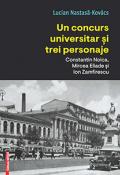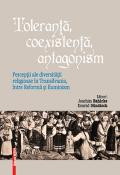
Contents
Foreword 9
Introduction 11
Program of the international conference 17
THE LIFE AND WORK OF ADALBERT CSERNI
Csaba Szabó Reconstructing Béla Cserni’s biography 23
Viorica Rusu-Bolindeț Adalbert Cserni’s contribution at the discovery of Governor’s Palace from Apulum – old and new perspectives 35
Radu Ota Adalbert Cserni and the Roman provincial art. Case studies from Apulum 53
SOCIAL AND ACADEMIC NETWORK OF THE PIONEERS OF ARCHAEOLOGY
Irina Achim, Corina Borș Grigore Tocilescu – a Pioneer of Romanian Archaeology in a European Perspective 61
Ioan Bejinariu Fetzer J. Ferencz (1856–1939) and the Archaeology from Sălaj 91
Olivér Gábor Szőnyi Ottó’s time capsule from 1913 101
Kirill Gusev The visit of D. N. Anuchin in Europe (1877–1879) and the international cooperation in archaeology and physical anthropology 113
Eszter Istvánovits András Jósa and his Contemporaries 119
Jenny Kaurin Charles Cournault (1815–1904) á la découverte des collections pre-romaines en Europe de L’Ouest (1873–1880) 131
Emanoil Pripon Dr. Mártonfi Lajos (1857–1908), a precursor of Transylvanian museology 143
Vladislav Sobolev People and fates. Pioneers of medieval archaeology in North-Western Russia (1870–1914) 153
Adrienn Wéber Juhász László (1842–1911), a pioneer of archaeology and antiquarian as founder of the Museum of Pécs 167
III. THE BEGINNINGS OF URBAN ARCHAEOLOGY IN EUROPE Florin-Gheorghe Fodorean Archaeological sites recorded by Téglás István in the territory of Potaissa 187
Ana Cristina Hamat Stories about Tibiscum. The research carried out by the priest Iosif Mircea at the Roman ruins from Jupa 205
Julien Trapp Johann Baptist Keune and Metz Museums (Moselle, France). The birth of modern archaeology in the annexed region of Lorraine (1892–1918) 219
FROM ANTIQUARIAN COLLECTIONS TO THE FIRST MUSEUMS
Cristina Bodó Archaeological research undertaken by the members of the History and Archaeology Society of Hunedoara County 235
Delia Roxana Cornea Unpublished testimonies about the beginnings of museology in Dobrudja in the late 19th century 251
Evgenia Zastrozhnova Archaeological materials from the excavations of Phanagoria (19th century) in the collection of the State Historical Museum (Moscow) 265
NATIONALISM AND OTHER IDEOLOGIES
Phil Freeman The consequences of Francis Haverfield’s visits east of Vienna in the 1880s 275
Heinrich Zabehlicky A political research-history: The case of Bruckneudorf between Hungary and Austria 321
Laura Coltofean Zsófia Torma: A pioneer of prehistoric archaeology in nineteenth-century Transylvania 327
Béla Santa In ‘the interest of science... from distant Transylvania’: Zsófia Torma’s research for British academic patronage 355
Csaba Szabó Histories of archaeology in Transylvania. A short overview 373
Maria Medvedeva The Imperial Archaeological Commission (1859–1919) and the national system of archaeological investigation in Russia 401
Abbreviations 413
List of Contributors 415





































